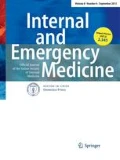Abstract
Residency training programs requirements state, “Residents should participate in scholarly activity.” However, there is little consensus regarding how best to achieve these requirements. The objective of this study is to implement a resident research program that emphasizes resident participation in quantitative or qualitative empirical work. A three-step program “Think, Do, Write” roughly follows the 3 years of the residency. During the first phase, the resident chooses a topic, formulates a hypothesis, and completes standard research certifications. Phase 2 involves obtaining Institutional Review Board approval, and conducting the study. The final phase entails analyzing and interpreting the data, and writing an abstract to present during an annual research day. Residents are encouraged to submit their projects for presentation at scientific conferences and for publication. Multiple departmental resources are available, including a Resident Research Fund, and full support of the faculty. Prior to the new program, most scholarly activity consisted of case reports, book chapters, review articles, or other miscellaneous projects; only 27 % represented empirical studies. Starting in 2012, the new program was fully implemented, resulting in notable growth in original empirical works among residents. Currently there is almost 100 % participation in studies, and numerous residents have presented at national conferences, and have peer-reviewed publications. With a comprehensive and supported program in place, emergency medicine residents proved capable of conducting high-quality empirical research within their relatively limited time. Overall, residents developed valuable skills in research design and statistical analysis, and greatly increased their productivity as academic and clinical researchers.

Similar content being viewed by others
References
ACGME program requirements for graduate medical education in emergency medicine, ACGME approved: September 30, 2012; effective: July 1, 2013
Levitt MA, Terregino CA, Lopez BL, Celi C (1999) A national profile of resident research programs in emergency medicine. Acad Emerg Med 6:348–351
Biros MH, Barsan WG, Lewis RJ, Sanders AB (1998) Supporting emergency medicine research: developing the infrastructure. Ann Emerg Med 31:188–196
Summers RL, Fish S, Blanda M, Terndrup T (1999) Assessment of the “scholarly project” requirement for emergency medicine residents: report of the SAEM Research Directors’ workshop. SAEM Research Directors’ Interest Group. Acad Emerg Med 6:1160–1165
Terregino CA, Levitt MA, Lopez BL, Eskra BD, Arnold GK (1999) A national profile of resident research experience. Acad Emerg Med 6(4):351–356
Levitt MA (1997) Can emergency medicine residents perform quality research? Acad Emerg Med 4:154–156
Pollack CV (1994) Residency research requirements: time for a reappraisal? J Emerg Med 12:75–76
Levitt MA, Terregino CA, Lopez BL, Celi C (1999) Factors affecting research directors’ and residents’ research experience and productivity in emergency medicine training programs. Acad Emerg Med 6:356–359
Neacy K, Stern SA, Kim HM, Dronen SC (2000) Resident perception of academic skills training and impact on academic career choice. Acad Emerg Med 7:1408–1415
Author information
Authors and Affiliations
Corresponding author
Ethics declarations
Conflict of interest
The authors declare that they have no conflict of interest.
Statement of human and animal rights
Drexel University has a Human Research Protection Program to ensure the protection of the rights and welfare of subjects in Human Research.
Informed consent
This project was deemed "exempt" by our IRB, no informed consent was necessary.
Additional information
This abstract was presented at the CORD Academic Assembly, April 2015, Phoenix AZ.
Rights and permissions
About this article
Cite this article
Nocera, R., Ramoska, E.A. & Hamilton, R.J. Building a resident research program in emergency medicine. Intern Emerg Med 11, 245–248 (2016). https://doi.org/10.1007/s11739-015-1354-x
Received:
Accepted:
Published:
Issue Date:
DOI: https://doi.org/10.1007/s11739-015-1354-x




